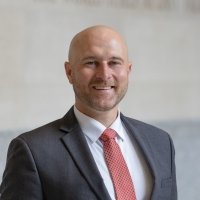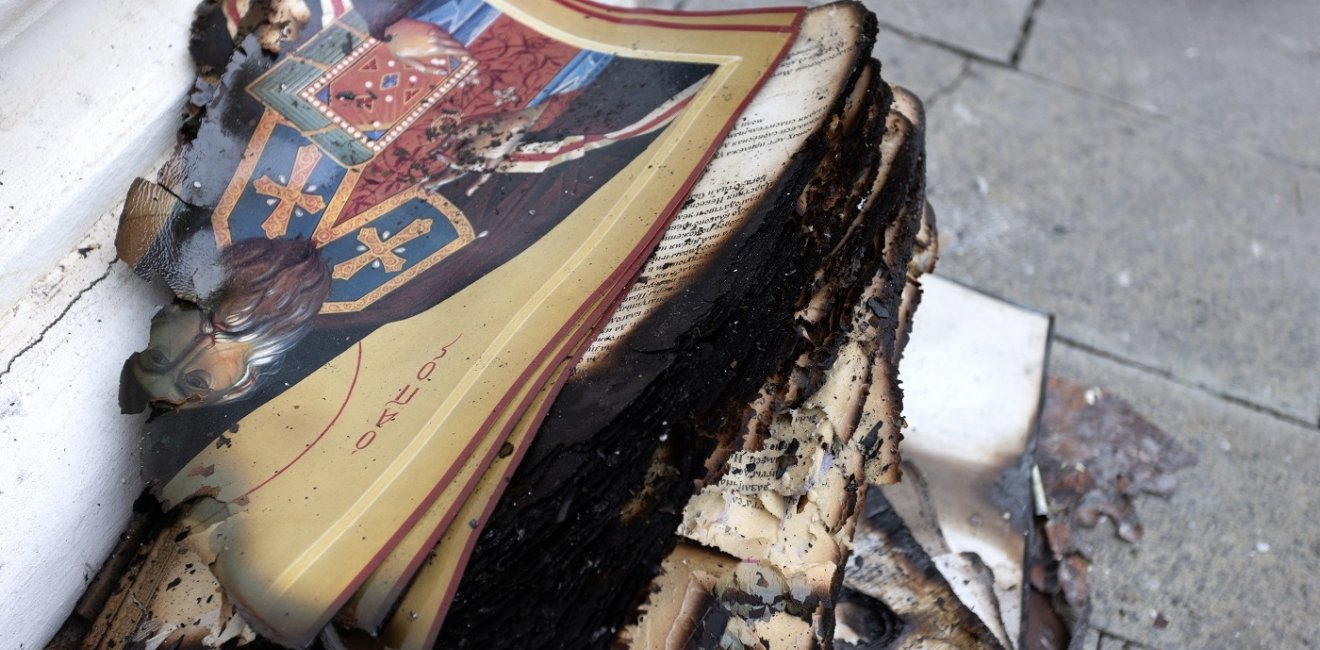
A blog of the Kennan Institute
Equating political dissent with heresy has become a central tactic of the Russian state, allowing it to silence opposition and enforce ideological conformity based on an orthodoxy of the Russian church and the “Russkiy Mir.” These efforts are not limited to the geographic borders of Russia. Attacks on religions alternative to the Russian Orthodox Church (ROC) have become a key part of Russia’s war against Ukraine.
The concept of the Russkiy Mir, or Russian World, positions Russia as more than a nation; it is a unique civilization whose culture and history are proclaimed to be superior across a broad sphere of influence, but especially in Ukraine and Belarus. The Kremlin has weaponized this ideology, wielding the authority and resources of the ROC, in what a study by 2024 study by the Institute for Democracy and Development “PolitA” characterized as an extension of state policy to suppress diversity and stifle freedoms of thought, speech, and belief. By intertwining political loyalty with religious doctrine, the state has effectively sidelined any religious expression or political perspective that deviates from the Church’s Kremlin-aligned narrative.
Russky Mir was further codified in the doctrine of the ROC by Patriarch Kirill, with the recent publication of a new textbook “To Holy Russia: Patriotism and Faith.” The publication deepens the split between not only Russian and Ukrainian believers but between Russia and Europe and even the broader community of Orthodox Churches. In April 2024, the Parliamentary Assembly of the Council of Europe (PACE) recognized the ROC as “an instrument of Kremlin propaganda.” Later in August, the Ecumenical Patriarch of Constantinople, denounced the militaristic, ethno-nationalist shift of the ROC as heretical.
According to a 2023 U.S. Department of State report, Russian authorities have investigated, detained, imprisoned, tortured, and abused individuals based on their religious beliefs or affiliations, especially targeting those classified as “extremist,” “terrorist,” or “undesirable.” The groups affected include Jehovah’s Witnesses, the Mejlis of the Crimean Tatars, Hizb ut-Tahrir, Tablighi Jamaat, followers of Turkish theologian Said Nursi, the Church of Scientology, Falun Gong, and various evangelical Protestant groups, along with various civil society organizations. Terms like “cults” and “sects” are deliberately used to stigmatize organizations that might have a societal influence but are not loyal to the regime.
The focus of especially ruthless suppression by the ROC and the Russian state are other denominations of Christianity, particularly Protestantism, which professes the individual’s relationship with God unmediated by earthly authorities. According to the ROC, Protestant churches that skirt the state-driven dictates of the ROC are effectively cults that distort the essence of Christianity. Under the pretext of protecting society from these so-called cults, anti-cult organizations and their representatives intentionally spread defamatory information about these groups in the media and organize campaigns to discredit them.
The intellectual force behind these efforts is the Russian Association of Centers for the Study of Religions and Sects (RACIRS). RACIRS is the umbrella organization uniting regional centers that address “destructive sectarianism in the post-Soviet space,” in the organization’s words. The centers conduct systematic monitoring of the activities of new religious movements and sects in Russia. RACIRS also provides a platform for religious experts to publish and disseminate research and analysis to a wide audience as part of its effort to discredit alternative religious practices.
According to one RACIRS report on the ban of Jehovah’s Witnesses in Russia, the religious movement "exhibits a hostile attitude toward our country, our people, and our traditions" and poses a particular danger owing to its methods of suppressing individual will and engaging in overt psychological manipulation, similar to methods used by openly terrorist organizations. The authors of the statement also highlighted the alleged collection of information about Russian citizens for transmission to the United States.
Russia’s oppression of religious freedom has spread beyond its borders as a core part of its neo-imperialist expansionist aspirations. The Kyiv-based National Institute for Strategic Studies reports that since the initial invasion of Ukraine in 2014, the temporarily occupied territories have turned into spaces of religious unfreedom. The collaborating authorities and separatist groups have implemented a model of state-religion relations akin to that of the Russian Federation, where the limits of religious freedom are determined by the willingness of religious communities to cooperate with the Putin regime and/or publicly demonstrate their loyalty to it.
Replicating the crackdown in Russia, the occupation forces in Ukraine have launched a concerted campaign against dissenting religious organizations under the pretext of combating "cults" and "extremists." This offensive employs a range of inhumane and illegal tactics, including the violent seizure of places of worship and the intimidation, abduction, and torture of believers. Notable targets include the Ukrainian Orthodox Church of the Kyiv Patriarchate, segments of the Crimean Tatar Muslim community, and various Protestant denominations, all branded as "undesirable" by the authorities.
With the onset of the large-scale war in February 2022, terror against clergy, religious centers, and believers intensified, with targeted shelling and destruction of churches, prayer houses, synagogues, mosques, and other religious structures becoming commonplace. The "Religion in Flames" project has documented over 500 religious buildings destroyed, with 9 percent completely obliterated and 16 percent suffering irreparable damage.
Abductions and killings of religious figures from various confessions have also escalated. The project’s database includes information on at least twenty-five clergy members killed, alongside civilians seeking refuge in religious sites. For instance, seventeen civilians died on June 19 during the shelling of the Bismillah Islamic Cultural Center in Severodonetsk. Despite these atrocities, Patriarch Kirill continues to publicly bless Russian soldiers as they go to battle against Ukraine and frame the invasion as a “holy war.”
The ROC has also had a key role in shaping Western views of the war by disseminating disinformation that influences the European political landscape by utilizing an international network of anti-cult organizations connected with RACIRS.
While some in the West sympathize with the views of the ROC, Ukraine-led efforts to catalogue the politicization, corruption, and ideological contradictions of the Russian church have been effective at combating ROC-promulgated disinformation. In April 2024, partnership between leaders of the Southern Baptist Church’s Theological Seminary and Ukrainian Baptist Church, were instrumental in advocating for U.S. aid for Ukraine. The coalition of faith leaders urged U.S. House Speaker Mike Johnson, a member and former official of their denomination, to support Ukraine in its struggle against Russia’s aggression.
Hannah Daniel, the Southern Baptist Convention’s Ethics and Religious Liberty Commission’s director of public policy, pointed out that Southern Baptists have consistently opposed authoritarian regimes that restrict religious freedom. “The resolve of our lawmakers to stand with Ukraine has wavered, despite the brutal persecution of Christians, particularly Baptists, the kidnapping of children, and the destruction of churches because of Russia’s unjust and unprovoked invasion of Ukraine,” she said.
This appeal to faith ultimately became one of the decisive factors influencing the eventual passage of the aid package. Its example suggests an important role for religious leaders to play alongside journalists and policymakers in disarming Russian disinformation and cultural warfare. Such a holistic approach might well be applied in countries vulnerable to Russian propaganda and espionage masked as religious activities such as in Moldova.
The opinions expressed in this article are those solely of the authors and do not reflect the views of the Kennan Institute.
Authors



Kennan Institute
After more than 50 years as a vital part of the Wilson Center legacy, the Kennan Institute has become an independent think tank. You can find the current website for the Kennan Institute at kennaninstitute.org. Please look for future announcements about partnership activities between the Wilson Center and the Kennan Institute at Wilson Center Press Room. The Kennan Institute is the premier US center for advanced research on Eurasia and the oldest and largest regional program at the Woodrow Wilson International Center for Scholars. The Kennan Institute is committed to improving American understanding of Russia, Ukraine, Central Asia, the South Caucasus, and the surrounding region through research and exchange. Read more

Explore More in The Russia File
Browse The Russia File
Chechnya as a Model of Modern Russia

Russia’s Indigenous Communities and the War in Ukraine

Gas and Power in a Changing US–Russia Relationship

